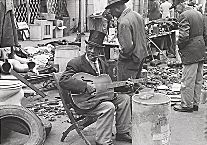| Entries |
| S |
|
Street Musicians
|

|
Maxwell Street was long the city's hotspot for street blues, until urban renewal and the expansion of the University of Illinois at Chicago claimed much of the prime territory. From Muddy Waters and Howlin' Wolf to Hound Dog Taylor and Maxwell Street Jimmy, the market earned renown as what author Ira Berkow termed “the most important area in the most important city for modern blues in America.”
The administration most friendly to street musicians was that of Mayor Harold Washington, who authorized a licensing system in the mid-1980s that allowed buskers to ply their trade for a token fee of 10 dollars. By the late 1990s, however, street musicians were once again subject to misdemeanor arrest for solicitation of public funds.
The Encyclopedia of Chicago © 2004 The Newberry Library. All Rights Reserved. Portions are copyrighted by other institutions and individuals. Additional information on copyright and permissions.